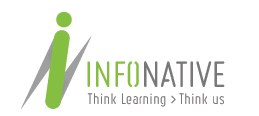
₹ 126400
₹75- ₹79
1600
₹63
-20

3 Apr 2025
7 Apr 2025
8 Apr 2025
Application Details
Infonative Solutions IPO is a book built issue of Rs 24.71 crores. The issue is entirely a fresh issue of 31.28 lakh shares.
Infonative Solutions IPO opens for subscription on March 28, 2025 and closes on April 3, 2025. The allotment for the Infonative Solutions IPO is expected to be finalized on Friday, April 4, 2025. Infonative Solutions IPO will be list on BSE SME with a tentative listing date fixed as Tuesday, April 8, 2025.
Infonative Solutions IPO price band is set at ₹75 to ₹79 per share. The minimum lot size for an application is 1600. The minimum amount of investment required by retail investors is ₹1,20,000. But it is suggested to the investor to bid at the cutoff price to avoid the oversubscription senerio, which is about to ₹1,26,400. The minimum lot size investment for HNI is 2 lots (3,200 shares) amounting to ₹2,52,800.
About Infonative Solutions Limited (SME IPO)
Incorporated in 2014, Infonative Solutions Ltd specializes in custom e-learning development for corporate and educational sectors. The company designs and delivers bespoke digital learning solutions, including cloud-based learning management systems (LMS), instructional design, gamification, AR/VR-based content, and software simulations.
Serving Fortune 500 companies, Big 4 consulting firms, IT/ITES, education, and government agencies across industries like BFSI, consulting, and FMCG, Infonative Solutions provides tailored training solutions such as product training, leadership training, and onboarding programs. It also offers services like program assessment, audience profiling, and prototype development to optimize learning experiences.
Its key products include MindScroll LMS, a mobile-responsive cloud-based learning management system; Off-The-Shelf Courses covering topics like soft skills and data visualization; and eLearning Market, a platform offering customizable eLearning templates, vector icons, and music for diverse project needs.
FAQ
IPO stands for "Initial Public Offering." It's the process through which a privately-held company becomes publicly traded by offering its shares to the general public and listing them on a stock exchange for trading. This allows the company to raise capital from investors and grants individuals and institutions the opportunity to invest in and own a portion of the company.
The life cycle of an IPO, or Initial Public Offering, begins with a company's decision to go public. It involves hiring underwriters, registering with regulatory authorities, determining the IPO price, marketing to investors, and the subscription period where investors place orders for shares. After allocation and listing, shares become publicly tradable, and the company enters the secondary market. Ongoing reporting and corporate governance are crucial as the company continues to operate as a publicly-traded entity. The IPO aims to raise capital for growth and provides investors with opportunities to trade shares in the company.
An IPO (Initial Public Offering) is when a private company goes public by selling shares to the public. Investors buy these shares, giving them ownership in the company. It's a way for companies to raise capital and expand. The process involves underwriters, regulatory filings, setting the IPO price, and marketing to investors. After the IPO, shares can be traded on a stock exchange. IPOs offer opportunities and risks, so investors should research and consider carefully.
"Upcoming IPOs" refers to initial public offerings that have been announced by private companies but have not yet occurred. These are companies that plan to go public in the near future by issuing shares to the public and listing them on a stock exchange. Investors often keep an eye on upcoming IPOs as they represent opportunities to invest in companies at their early stages of public trading, potentially capturing growth potential. These offerings are typically accompanied by significant media and investor attention as they approach their launch dates.
 Download
Download